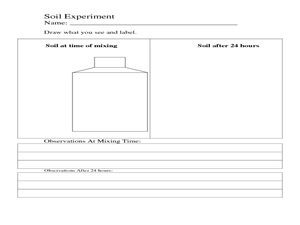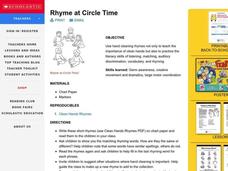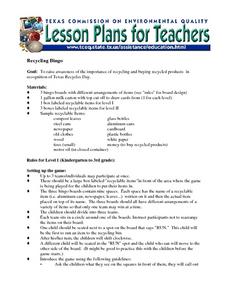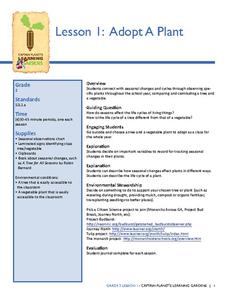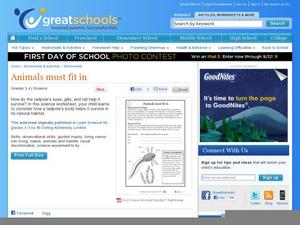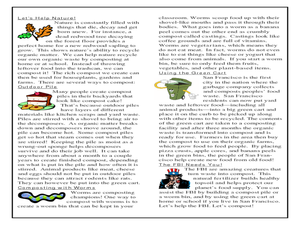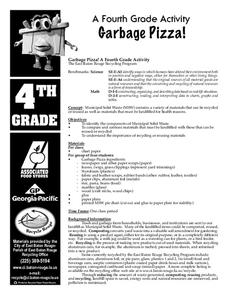Curated OER
Under Our Feet
Students investigate the forest ecosystem to learn of the living and non-living elements of the soil. In this ecosystem lesson, students examine soil for twigs, moss, fungi, leaves, roots and other matter. Students complete a...
Curated OER
How Can We Conserve Water?
Pupils describe the importance of water conservation and list ways to conserve. They construct composts and fill them with materials that recycle nutrients. They inspect their homes for leaky pipes, toilets, and faucets.
Curated OER
Rhyme at Circle Time
Students study the importance of clean hands and practice the literacy skills of listening, matching, auditory discrimination, vocabulary, and rhyming. They illustrate their rhyme chart with drawings or photos taken doing the different...
Curated OER
Recycling Bingo
Students participate in Texas Recycles Day. They discover the importance of recycling and how it helps the environment. They discover which products are recyclable and which ones are not.
Curated OER
Eco-enrichers
Young scholars discover the importance of plant and animal components within soil. In this soil lesson plan, students test the quality of soil. Young scholars then conduct an experiment adding different components to bags of soil to see...
Curated OER
Are You Balanced With Your Environment?
Students discuss the impact of not keeping the environment in balance for future generations. As a class, they are introduced to the concept of "Balance of Nature" and what it means. In groups, they research the role of trees and how to...
Curated OER
Think Green
Learners experience and practice compositing and recycling through hands-on-activities. They distinguish between which items from their trash can be recycled, composted and reused. The process for making recycled paper is also covered in...
Captain Planet Foundation
Adopt-A-Plant
Note the way that plants change during the season by adopting a plant on your school campus. After your class chooses their plant, they research the plant's needs, how it differs from other plants, find ways to support their plant's...
Curated OER
Dinnertime for Animals
Is a deer an herbivore? What about a spider? Experiment with the food chain in an interactive science experiment. After listing the herbivores from a selection of animals, third and fourth graders compare the skulls and teeth of...
Curated OER
Growing Vegetable Soup
Students use children's literature in order to think about the concept of creating a garden. This is done through conducting simple research about types of plants that could be grown in the area and how to care for them. Then the garden...
Curated OER
Sensational Seaweed
Learners compare kelp and land plants. In this sea plant lesson, students look at the role of algae in aquatic environments. They research the properties of kelp and explore seaweed.
Curated OER
Animals Must Fit In
A instructional activity on tadpoles is here for your young biologists. Learners read a short paragraph on tadpoles, then answer three questions regarding how parts of their bodies help the tadpole to survive in the pond. There is a good...
PBS
Cloud Clues
It's cloudy with a good chance of learning! An inquiry-based lesson begins with an exploration of transparent, translucent, and opaque materials. Young scientists then connect their learning to the different cloud types as they take the...
PBS
Twirling in the Breeze
Blow classes away with a hands-on lesson investigating wind speed. Learners use common materials to design and construct anemometers. They then test their anemometers and collect data on the wind speed created by a fan.
Curated OER
Big Fat, Juicy Worms
Students collect and study information about worms. They discover how an earthworm helps process and loosen the soil. They write in their journals as well.
Curated OER
Investigating the Response of Worms to Soil Improvers
The worms crawl in, the worms crawl out, but do they care what soil is all about? Find out in an easy and fun controlled experiment. Have your young biologists hypothesize, test, and draw conclusions about which type of soil worms...
Curated OER
Slash Trash! Reducing, Reusing and Recycling Our Way to Zero Waste
The other "Three Rs" are covered in this lesson: reduce, reuse, and recycle. Over four weeks, conservationists collect data about waste in their own homes. They combine their findings with those of other students in order to analyze...
Curated OER
Food chains and webs
Here is an extremely simplistic look at food chains and webs. It depicts three different food chains, each containing a plant, plant eater, and meat-eater. Learners fill in the missing part of each chain by using the images provided at...
Curated OER
Let's Build a Worm Bin
Students explore the process of decomposition. In this ecology and measurement lesson, students prepare a worm home to be used for vermicomposting. Students weigh a group of worms and the added food, recording this information on a data...
Curated OER
Reduce Reuse Recycle
Young scholars discover methods that can save the planet by recycling. In this sustainable planet lesson, students read The Berenstein Bears Don't Pollute Anymore, and practice memorizing the 3 R's. Young scholars write commitment...
Curated OER
Contrasting Landscapes - UBC Farm Field Trip
Students visit the UBC Farm. In this lesson on various landscapes, students spend a day at the University of British Columbia exploring the farm and trail adjoining the campus. This lesson could be modified for use in any region that has...
Curated OER
Gardening with Your Students
By growing a class or school garden you can teach students about the environment, the life cycle of a plant, and healthy eating.
Curated OER
Test Your Trash IQ Crossword Puzzle
In this trash recycling crossword puzzle, students complete a word puzzle about proper trash recycling. They read 17 clues and place the answers in the proper place on the crossword puzzle.
Curated OER
Garbage Pizza
Fourth graders explore the concept of waste management. In this recycling lesson, 4th graders identify materials that must be landfilled as well as items that may be recycled or reused.


